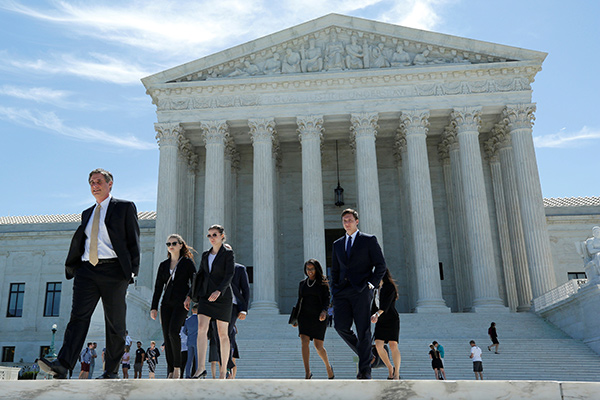US top court rejects Trump bid to include grandparents in travel ban
 |
|
People walk out after the US Supreme Court granted parts of the Trump administration's emergency request to put his travel ban into effect immediately while the legal battle continues, in Washington, US, June 26, 2017. [Photo/Agencies] |
WASHINGTON — The US Supreme Court rejected on Wednesday a bid by President Donald Trump to include grandparents and other relatives of Americans in his travel ban on people from six Muslim-majority countries.
But in a partial win for Trump, the court gave the government more leeway to enforce a separate ban on refugees that was included in a March 6 executive order the president said was necessary for national security.
A federal judge had ruled against the government on the scope of both bans last Thursday, prompting the administration to seek Supreme Court intervention.
The high court's mixed decision means that, for now, grandparents, grandchildren, aunts, uncles, nieces, nephews, cousins, and siblings-in-law are not covered by the 90-day travel ban on people from Iran, Libya, Somalia, Sudan, Syria and Yemen who want to enter the United States.
The court's action on refugees could block entry of up to 24,000 refugees who have a connection to a US resettlement agency, according to court papers. The Trump administration has said that even if all 24,000 were able to travel, not all of them would have been able to do so during the 120 days the refugee ban is in effect.
The brief order said the court's decision is temporary while the San Francisco-based 9th US Circuit Court of Appeals considers a separate appeal on the same issue. Three of the conservatives on the court of nine justices noted that they would have granted Trump's request in full.
In a statement, the US Department of Justice said it "looks forward to presenting its arguments" to the 9th Circuit.
Hawaii Attorney General Douglas Chin, who challenged the bans in court, said in a statement that his office also is preparing arguments for the appeals court on the refugee issue. Chin said the Supreme Court had validated Hawaii's position "that the Trump administration over-reached in trying to unilaterally keep families apart from each other."




















